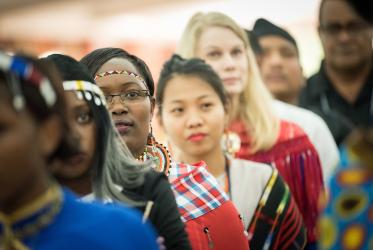Rev. Joram Calimutan, from the United Church of Christ in the Philippines, is a program coordinator for the Asia Pacific Mission for Migrants, Hong Kong.
He reflected that job loss during COVID-19 has hit migrants and refugees particularly hard. “Unemployed migrants are now facing a bleak future,” he said, and future generations are shouldering those hardships as well. “Children of migrants have stopped schooling.”
Rev. Dr Deidre Palmer, president of the Uniting Church in Australia said that, from the beginning of the pandemic, churches in Australia have been advocating. “Some emergency payments have been made at federal and state levels but those are not substantial,” she said. “Loss of income has put a strain on housing.”
Alicia Mathura, a theatre arts teacher who teaches English to speakers of other languages, works with the Presbyterian Church of Trinidad and Tobago. “Over 40,000 Venezuelan migrants are living here, both legally and illegally,” she said. “They are promised a better life as soon as they get there but, sadly, many are victims of human trafficking.”
Dr Torsten Moritz, general secretary of the Churches' Commission for Migrants in Europe, noted that the picture in Europe is differentiated in all of the 47 different countries on the European continent. “Some people could telework, or work from home, but if you’re in the service industry, if you're in the care sector, that’s very, very difficult,” he said. “Indeed, becoming invisible was one of the problems.”
Priyanka Samy, social activist and intersectional feminist, Church of South India, National Federation of Dalit Women, gave a perspective on India’s caste system and the particular vulnerability of women. “Women are on the frontlines of providing care but their labor and contributions continue to be invisible during the pandemic,” she said. “The COVID-19 crisis really just highlighted the long-term neglect on women, particularly women from vulnerable communities.”
Rev. Jack Amick, director of Global Migration and Special Assignments, United Methodist Committee on Relief, joined the conversation as a theological listener. “We need to remember that these are our roots: migration is who we are and how we are called to serve,” he said. “We have in migrants people who spend a good chunk of their lives running and moving, and we are called to help them.”
Rev. Michael Blair, general secretary of The United Church in Canada, is a WCC Commission on World Mission and Evangelism commissioner and moderator of the WCC Mission from the Margins Working Group. He moderated the discussion, helping participants focus on particular challenges of people on the move during the COVID-19 pandemic, how churches can become involved, and how women and children are vulnerable.








